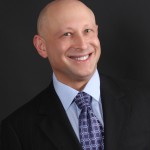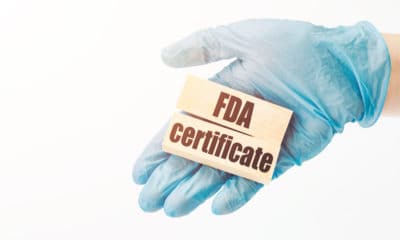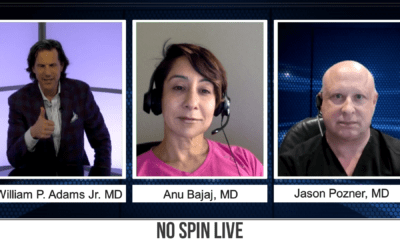A story often heard, another doctor unqualified to perform plastic surgery procedures is – you guessed it – under legal fire by 15 female patients for surgical complications. The doctor in question was trained in family practice, a medical specialty woefully short in required experience for surgery.
Why is it that non-qualified doctors get into performing plastic surgery procedures? Why do patients end up in unqualified offices to request procedures the doctor doesn’t have adequate training for? Board certified plastic surgeons discuss on the latest episode of No Spin Live!
Misrepresentation in the Medical Community
Perhaps the most obvious problem with these situations is how unqualified doctors get patients in the door for plastic surgery procedures. If a doctor only trained in family practice – years and years shy of the training and experience required to achieve status as a qualified surgeon – why are patients giving them the time of day, and worse, putting their lives into the doctors’ hands?
“There’s always two sides to this story,” explains board certified plastic surgeon Dr. Jason Pozner. “One is, the guy was completely misrepresenting himself as a board certified plastic surgeons. On this show, we’re all board certified plastic surgeons. It means we’re qualified in our fields, and we’ve gotten to a certain state by following the rules. Obviously this guy is just trying to ride on our coattails by advertising whatever.”
Advertising and marketing are powerful, but their power can be used for both good and ill. With the speed and shortcuts available thanks to the digital age, it takes little more than some hard work to set up a website that could claim all sorts of things. Flashy pictures and bold headlines may alleviate all concerns about what a doctor’s true skillset is, and which accreditations are meaningful. Due to this, there is some responsiblity on the patient to know what to look for, and to simply do research from the get-go.
“In this day and age of the internet, the women should be looking up the doctor and checking their credentials themselves to make sure that this is a board certified plastic surgeon,” continues Dr. Pozner.
Do the Lawsuits Have Merit?
In many of these cases, the unfortunate result is death. In this particular case, many of the lawsuits dealt with fairly common complications following some plastic surgery procedures.
“Some of the lawsuits that I read that this doctor had were capsular contracture – which can happen to anybody!” says Pozner. “Whether you’re a board certified or not, we get capsular contracture.”
Dr. Dustin Reid, a board certified plastic surgeon practicing in Austin, disagrees. While the complications are in fact somewhat common in even the best of hands, the frequency is what should disturb readers.
“Jason, I’m going to argue with you on that,” Dr. Reid begins. “I agree with you that he misrepresented himself, but then you turned around and said he had the complications we all have. But by definition, if you have the training, you are going to have fewer of these complications. I would say no one on this panel – or anyone that we would respect as a good board certified plastic surgeon – has 12 lawsuits against them for this sort of thing.”
Complications do happen in the hands of the best plastic surgeons. The importance of seeing an expert is that they know best how to deal with complications – both the extremely serious ones that could always happen on the OR table and those that happen months and years later as the body reacts to the changes that were made.
The mark of a great surgeon is their understanding that surgery is dangerous. Whether a surgeon is removing an appendix or augmenting the breast, general anesthesia is no laughing matter. Board certified plastic surgeons employ board certified anesthesiologists and other expert help in the OR to guard against the dangers of surgery, a situation that may not be mirrored in the offices of a family practice doctor with little to no OR experience.
“If you learn anything in those 9 years of training, it’s how dangerous surgery can be,” continues Reid.” That’s what these doctors miss. They see how easy [surgery] is a lot of the time, but they don’t see how scary and dangerous it can also be. They have no idea how to manage it when it gets that way. Everyone on this panel has taken care of trauma patients, cardiovascular patients… We know how to manage a problem when it occurs, and that’s what separates us.”
Legal Issues Regarding Qualifications
Part of the issue may be legal. As it currently stands, it is up to the state to legislate on these matters – and there is no legislation that states plastic surgery procedures can only be legally performed by board certified plastic surgeons.
“I just got a case from the Texas Medical Board yesterday of a family practice doctor in a smaller town doing fat transfer to the breast,” shares board certified plastic surgeon Dr. Ashley Gordon, practice partner to Dr. Reid in Austin.” Long story short, the patient got admitted and had multi-system organ failure. It’s really tricky. These doctors clearly misrepresent themselves, and as Jason said, the onus is on the patient to do their homework. But, if you’ve been to the American Academy of Cosmetic Surgery website, they literally sound like they would be better than we are as plastic surgeons.

“They say, ‘We specialize just in aesthetic surgery of the face and body. Plastic surgeons are doing reconstruction. They’re doing hand surgery, they’re doing kids and craniofacial. The cosmetic surgeons are more focused.’ There needs to be legislation against this sort of thing. This guy did 2 years of a family practice residency and said he did surgery within it, like taking off moles and lumps and bumps?”
The issue becomes even more complicated when the details emerge. Dr. Dan Del Vecchio, a board certified plastic surgeon in Boston, explains the problems revolving around the standard of care:
“In order to prove malpractice you have to prove deviation from the standard of care and irreparable harm,” he explains. “Now, whether or not these patients were harmed or not is a different matter, but here’s the problem. The standard of care includes these doctors doing plastic surgery now! Not one state will legislate that you have to have board certification to perform a medical specialty. And because of that, it is the standard of care that non-plastic surgeons do plastic surgery.”
“My point is this: There are a lot of problems but one huge problem here is the states will not commit and say, ‘Mrs. Glutz, you can’t practice plastic surgery in Texas because you don’t have a board certification in plastic surgery.’ They allow it! And by allowing it, it becomes the standard of care.”
Legal Headaches Aside, What Can Patients Do Right Now?
The wheels of government turn slowly, even if positive changes were decided upon and destined to be implemented. For patients curious now in plastic surgery, the first step always begins with education. As noted above, surgery is serious, serious business. Patients looking for surgical rejuvenation need to understand this, and thus realize how critical it is to research surgeon’s, vet them based on their qualifications and experience, and solidify the research by meeting them in person and discussing desires.
“The bottom line for the patients: do your homework,” concludes Dr. Pozner. “Go to the expert. Do not go to the lowest-cost provider. The lowest-cost provider is probably not your best choice. The internet is absolutely available for you to do your homework, right now.


















Facebook
Twitter
Instagram
YouTube
RSS